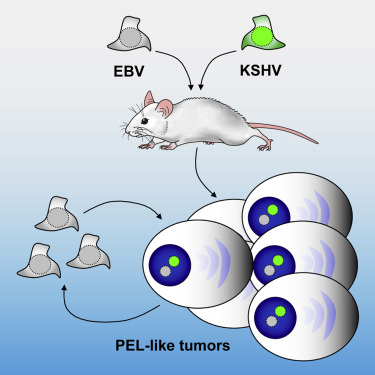Cell Host & Microbe ( IF 30.3 ) Pub Date : 2017-07-12 , DOI: 10.1016/j.chom.2017.06.009 Donal McHugh 1 , Nicole Caduff 1 , Mario Henrique M Barros 2 , Patrick C Rämer 1 , Ana Raykova 1 , Anita Murer 1 , Vanessa Landtwing 1 , Isaak Quast 3 , Christine T Styles 4 , Michael Spohn 5 , Adeola Fowotade 6 , Henri-Jacques Delecluse 7 , Alexandra Papoudou-Bai 8 , Yong-Moon Lee 9 , Jin-Man Kim 9 , Jaap Middeldorp 10 , Thomas F Schulz 11 , Ethel Cesarman 12 , Andrea Zbinden 13 , Riccarda Capaul 13 , Robert E White 4 , Martin J Allday 4 , Gerald Niedobitek 2 , David J Blackbourn 6 , Adam Grundhoff 5 , Christian Münz 1

|
The human tumor viruses Epstein-Barr virus (EBV) and Kaposi sarcoma-associated herpesvirus (KSHV) establish persistent infections in B cells. KSHV is linked to primary effusion lymphoma (PEL), and 90% of PELs also contain EBV. Studies on persistent KSHV infection in vivo and the role of EBV co-infection in PEL development have been hampered by the absence of small animal models. We developed mice reconstituted with human immune system components as a model for KSHV infection and find that EBV/KSHV dual infection enhanced KSHV persistence and tumorigenesis. Dual-infected cells displayed a plasma cell-like gene expression pattern similar to PELs. KSHV persisted in EBV-transformed B cells and was associated with lytic EBV gene expression, resulting in increased tumor formation. Evidence of elevated lytic EBV replication was also found in EBV/KSHV dually infected lymphoproliferative disorders in humans. Our data suggest that KSHV augments EBV-associated tumorigenesis via stimulation of lytic EBV replication.
中文翻译:

持续的 KSHV 感染通过增强的 EBV 裂解基因表达增加体内 EBV 相关肿瘤的形成
人类肿瘤病毒 Epstein-Barr 病毒 (EBV) 和卡波西肉瘤相关疱疹病毒 (KSHV) 在 B 细胞中建立持续感染。KSHV 与原发性渗出性淋巴瘤 (PEL) 相关,90% 的 PEL 也含有 EBV。体内持续性KSHV感染的研究由于缺乏小动物模型,EBV 共感染在 PEL 发展中的作用受到阻碍。我们开发了用人类免疫系统成分重组的小鼠作为 KSHV 感染的模型,发现 EBV/KSHV 双重感染增强了 KSHV 的持久性和肿瘤发生。双重感染的细胞显示出类似于 PEL 的浆细胞样基因表达模式。KSHV 持续存在于 EBV 转化的 B 细胞中,并与裂解 EBV 基因表达相关,导致肿瘤形成增加。在人类 EBV/KSHV 双重感染的淋巴组织增生性疾病中也发现了裂解性 EBV 复制升高的证据。我们的数据表明,KSHV 通过刺激裂解性 EBV 复制来增强 EBV 相关的肿瘤发生。



























 京公网安备 11010802027423号
京公网安备 11010802027423号